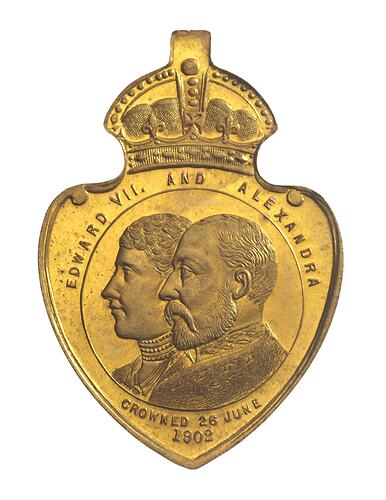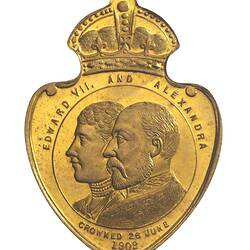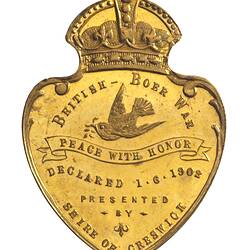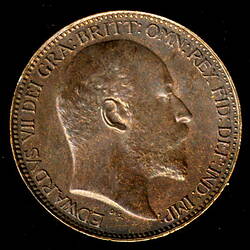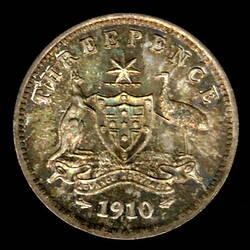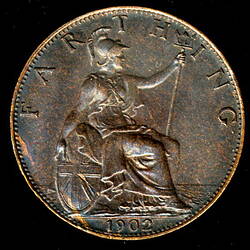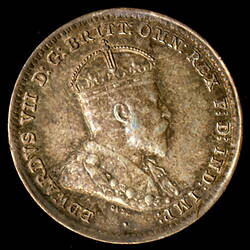Edward VII (Albert Edward) was born at Buckingham Palace, the second child and first son of Queen Victoria and Prince Albert of Saxe-Coburg-Gotha.
Queen Victoria and Prince Albert were determined that their eldest son should have an education that suited a constitutional monarch. Prince Albert devised a rigorous educational program and at age seven 'Bertie' began work under a number of tutors. He did not excel, unlike his older sister Victoria, and his true talents were ultimately found to be those of charm, sociability and tact. Nevertheless in 1859 he matriculated as an undergraduate at Christ Church, University of Oxford, and in 1861 after a brief stint in the Army transferred to Trinity College, University of Cambridge. Here he gained a reputation as a playboy rather than a scholar.
In the same year, his father Prince Albert visited him at Cambridge, reprimanded him about a scandalous affair and returned home to die two weeks later, ostensibly from typhoid but probably from pneumonia and stomach cancer. The inconsolable Queen blamed the Prince of Wales for his father's death. She regarded him as indiscreet, frivolous and completely unsuited to responsibility.
The widowed Queen Victoria withdrew from public life, but nevertheless arranged for her son to marry Princess Alexandra of Denmark, the beautiful elder daughter of King Christian IX of Denmark and his wife, the former Princess Louise of Hesse-Cassel. The couple wed on 10 March 1863. The Prince and Princess of Wales had three sons and three daughters, including the future King George V.
Even as a married man and father, Bertie continued to keep mistresses (among them actress Lillie Langtry and society identity Alice Keppel) and reportedly produced a number of out-of-wedlock children. He also indulged in pursuits such as gambling and country sports, and entertained on a lavish scale. Due to his portly appearance, the King became nicknamed 'Tum-Tum'. Several incidents - including a court appearance in a notorious divorce case - brought him bad publicity, and he continued to be regarded as unsuitable material for a future monarch. Nonetheless, he represented the Queen in public duties, became a patron of the arts and sciences and helped found the Royal College of Music.
When Queen Victoria died on 22 January 1901, Bertie became King. At the age of 59 he was the oldest man ever to ascend the British throne. Edward VII and Queen Alexandra were crowned at Westminster Abbey on 9 August 1902.
Edward VII had once wanted to join the Army, and his main interests lay in military and naval matters and foreign affairs. He played a role in the modernization of the Home Fleet and the reform of the Army Medical Services. Fluent in French and German, he made a number of visits abroad, including a visit to France in 1903 that helped create the atmosphere for the Anglo-French Entente Cordiale. The Entente marked the end of centuries of Anglo-French rivalry and Britain's isolation from continental affairs. In 1907 Edward also became the first British Monarch to visit Russia.
Edward VII was related to nearly every other European monarch and became known as the 'uncle of Europe'. His volatile relationship with his nephew, Wilhelm II, aggravated tensions between Germany and Britain in the decade before World War I. He had internal political difficulties too, becoming embroiled in a constitutional crisis in the last year of his life when the Conservative majority in the House of Lords refused to pass the 'People's Budget'. Edward died on 6 May 1910, before the crisis was resolved by a general election. He was succeeded by his second son, George V.
'The first issue of coins of His Majesty, King Edward VII was made in 1902, the royal proclamation being dated 10 December 1901 for gold and bronze and 13 January 1902 for silver. No change was made in the standards of weight and fineness, and the denominations of coins were identical with those of the last issue of Queen Victoria.' (Hocking 1903, p. 203) The British coinage of King Edward VII's reign was legal tender in Australia.
References:
Hocking, William. (1903). Catalogue of the Coins, Tokens, Medals Dies and Seals of the Royal Mint. London
Wikipedia Encyclopaedia web site http://www.wikipedia.org/wiki/Edward_VII_of_the_United_Kingdom
More Information
-
Keywords
-
Localities
-
Authors
-
Article types
